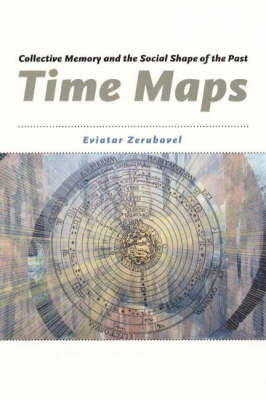
Time Maps
Collective Memory and the Social Shape of the Past
Seiten
2003
University of Chicago Press (Verlag)
978-0-226-98152-9 (ISBN)
University of Chicago Press (Verlag)
978-0-226-98152-9 (ISBN)
In a pioneering attempt to map the structure of our collective memory, Zerubavel considers the cognitive patterns we use to organize the past in our minds, the mental strategies that help us string together unrelated events into coherent and meaningful narratives.
Who were the first people to inhabit North America? Does the West Bank belong to the Arabs or the Jews? Why are racists so obsessed with origins? Did the terrorist attacks of September 11 mark the end of an era? Or the beginning of a new one? As Eviatar Zerubavel demonstrates in "Time Maps", we cannot answer burning questions such as these without a deeper understanding of how we envision the past. In a pioneering attempt to map the structure of our collective memory, Zerubavel considers the cognitive patterns we use to organize the past in our minds, the mental strategies that help us string together unrelated events into coherent and meaningful narratives, and the social grammar of battles over conflicting interpretations of history.
Drawing on fascinating examples that range from Hiroshima to the Holocaust, from Watergate to the West Bank, and from ancient Rome to the former Yugoslavia, Zerubavel shows how we construct historical origins; how we organize time into stories; how we tie discontinuous events together into eras; how we link families and entire nations through genealogies; and how we separate distinct historical periods from one another through watersheds, such as the invention of fire or the fall of the Berlin wall. Most people think the Roman Empire ended in 476, even though it lasted another 977 years in Byzantium. Challenging such conventional wisdom, "Time Maps" should be valuable reading for anyone interested in how the history of our world takes shape.
Who were the first people to inhabit North America? Does the West Bank belong to the Arabs or the Jews? Why are racists so obsessed with origins? Did the terrorist attacks of September 11 mark the end of an era? Or the beginning of a new one? As Eviatar Zerubavel demonstrates in "Time Maps", we cannot answer burning questions such as these without a deeper understanding of how we envision the past. In a pioneering attempt to map the structure of our collective memory, Zerubavel considers the cognitive patterns we use to organize the past in our minds, the mental strategies that help us string together unrelated events into coherent and meaningful narratives, and the social grammar of battles over conflicting interpretations of history.
Drawing on fascinating examples that range from Hiroshima to the Holocaust, from Watergate to the West Bank, and from ancient Rome to the former Yugoslavia, Zerubavel shows how we construct historical origins; how we organize time into stories; how we tie discontinuous events together into eras; how we link families and entire nations through genealogies; and how we separate distinct historical periods from one another through watersheds, such as the invention of fire or the fall of the Berlin wall. Most people think the Roman Empire ended in 476, even though it lasted another 977 years in Byzantium. Challenging such conventional wisdom, "Time Maps" should be valuable reading for anyone interested in how the history of our world takes shape.
Eviatar Zerubavel is a professor of sociology at Rutgers University. He is the author of seven other books, including Social Mindscapes: An Invitation to Cognitive Sociology, The Seven-Day Circle: The History and Meaning of the Week, and The Fine Line: Making Distinctions in Everyday Life.
| Erscheint lt. Verlag | 15.5.2003 |
|---|---|
| Sprache | englisch |
| Maße | 16 x 23 mm |
| Gewicht | 425 g |
| Themenwelt | Geisteswissenschaften ► Geschichte ► Geschichtstheorie / Historik |
| Geisteswissenschaften ► Religion / Theologie | |
| Sozialwissenschaften ► Soziologie | |
| ISBN-10 | 0-226-98152-5 / 0226981525 |
| ISBN-13 | 978-0-226-98152-9 / 9780226981529 |
| Zustand | Neuware |
| Haben Sie eine Frage zum Produkt? |
Mehr entdecken
aus dem Bereich
aus dem Bereich
Russland, die Ukraine und der Westen
Buch | Softcover (2024)
De Gruyter (Verlag)
39,95 €
Geschichte und Theorie
Buch | Softcover (2024)
De Gruyter Oldenbourg (Verlag)
24,95 €
wie Irritationen historisches Denken anregen
Buch | Softcover (2024)
Kohlhammer (Verlag)
69,00 €


